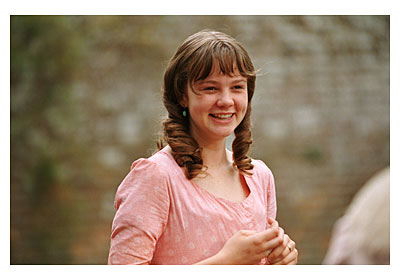I think, in reading Pride and Prejudice, that one of my favorite characters is also one of the most—if not the most—ignored. Poor Kitty Bennet spends most of the novel as basically an afterthought: she’s not as flighty as Lydia and not as didactic as Mary, and all anybody remembers about her is her (not-on-purpose) cough. (This is true to the point where I had completely forgotten who even plays her in the 2005 version; IMDB reminds me that it is, in fact, a not-yet-famous Carey Mulligan!) It’s a tough life, being Kitty, but I think Jane made it that way on purpose, for two reasons:
I like Kitty because she represents the phases that we all go through—the ways in which we’re susceptible to other people. The truth is, Kitty’s not a very strong personality, and she follows Lydia’s ridiculous example without a fight, or even (and I think this is generous) very much thought. But don’t we all do this (not me, of course; I’m talking about the rest of you!)? Don’t we (I mean you) find, in hindsight, times where we weren’t ourselves, or when we did things that we’d never have thought of on our own—all because somebody else looked like they were having fun? I like that Jane includes this subtle socio-personal detail among all the prideful and prejudicial behavior going on. Not everybody, it seems, is either Elizabeth Bennet-smart or Mrs. Bennet-vapid one hundred percent of the time. I like that Kitty’s a regular girl going through a slightly obnoxious period in her life. Just like 80s bangs and wearing leggings as pants, right? We’ve all been there.
I also like Kitty because she represents the ways in which people can grow up and change—Mary will probably always love a good truism, and Lydia’s unlikely to come to her senses anytime soon, but I always like to think that Kitty’s going to turn out okay. With Lydia gone, even the end of the novel feels like she’s coming out of some sort of fog of silliness (she will, of course, now be left at home with Mary and Mrs. Bennet, but one hopes Mr. Bennet will reach out to his second-youngest daughter as a potential island of sense). In an odd, side-plot kind of way, it’s thrilling! For probably the first time since Lydia arrived on the scene, drama-queening it up ostensibly from the womb, Kitty’s on her own—it’s the end of a small, subtle character arc, but we’re assured that things will continue in a positive manner. That Jane! She sure does know people.
And that is why, although one of the most important novels in the English language is packed with memorable and intelligent (though flawed) characters, I have a soft spot for one slightly obnoxious teenage girl—I hope that one day she’ll become one of them.
